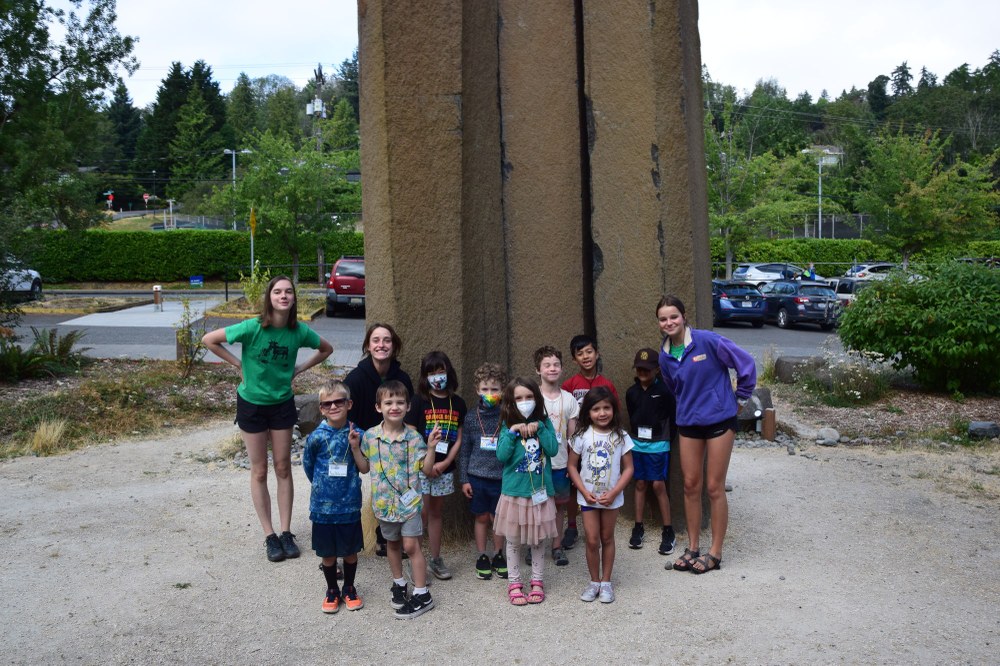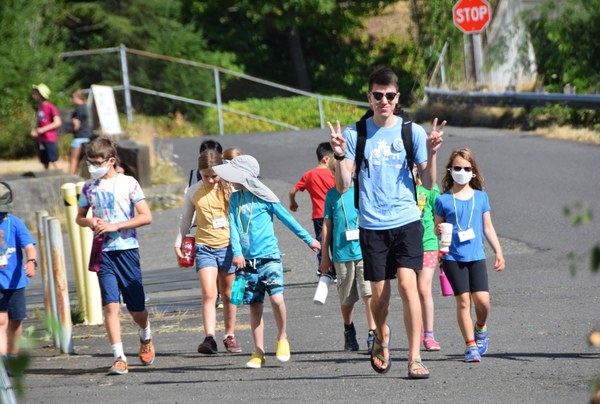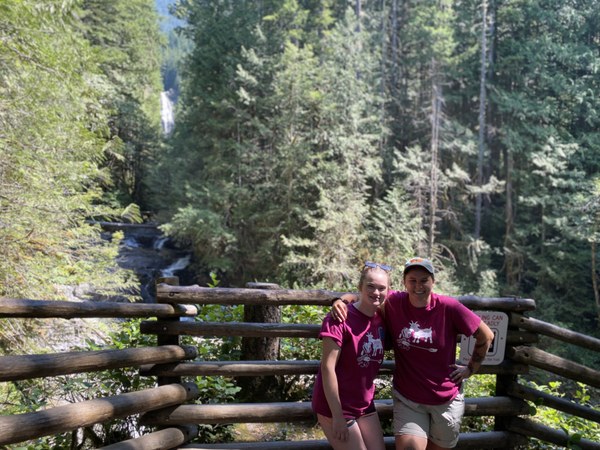
This article was written by Tailor Dolgin, Summer Camps Manager, and Maggie O'Shea, counselor in training.
Summer is a special season at The Mountaineers. Our program centers and lodges buzz with activity as campers fill the buildings, bringing with them their contagious excitement for making new friends and new connections to the outdoors. When campers, counselors, and counselors-in-training (CITs) come together, they create lasting memories — both blissful and challenging — that shape how they engage with the world around them. Tailor Dolgin, Camps Program Manager, and Maggie O'Shea, CIT, reflect on the growth they've seen and experienced as a part of our Summer Camp Programs.
Hard is not the same as bad
Tailor
Before campers are even out of school, our team of camp staff and CITs begins camp preparations. We attend trainings, hone our climbing skills, pore over handbooks, and play team-building games. This pre-camp preparation becomes the baseline for the summer ahead, allowing staff to build relationships and bond over shared experiences before camp begins. First day of camp anticipation feels like the excitement of a holiday mixed with the nervousness of starting a new job. It’s my second favorite part of the summer.
My favorite part of summer is bearing witness to the resiliency and growth that staff, CITs, and campers experience. Whether it’s a camper being lowered off a climb with a smile on their face despite having cried at the top of the wall, or a staff member confidently leading their first group assembly, growth is abundant. Our program is tailored toward creating empowering and transformative outdoor experiences for youth. If you know where to look, you’ll often see the same growth in our staff, too.
A camp instructor once shared with me that while working at camp is a lot of fun, it’s easy to forget during the off-season and pre-camp preparations how much mental fortitude is necessary to keep everyone happy, healthy, and safe on a daily basis. In order to provide a great experience for 70 campers during the week, you may end up sacrificing your own happiness or testing your own patience. Occasionally things will get difficult, and you have to move forward with the plan anyway. Sometimes you lead an activity perfectly; sometimes you don’t. And that’s okay. Not every day is going to be easy. Staff and CITs learn this lesson repeatedly throughout the summer.
Our staff mantra at camp is that hard is not the same as bad. This is because our staff accomplish a lot when they learn hard things, like how to enforce consequences for behavior or how to teach climbing commands after only learning them two weeks prior. They develop transferable communication skills, learn self-efficacy, and flex their creative muscles. They discover that they can tackle challenges and have fun doing it. Then they model this willingness to challenge themselves even when the going gets tough for campers, too.
Flexible expectations
Maggie
Before I was born, my parents were Mountaineers members. They filled every free moment with rock climbing, camping, and hiking. When they took me camping and hiking in the summers, they passed on their love for these activities to me. It was only natural for them to enroll me in an outdoor-based summer camp with The Mountaineers.
 Kenji McCracken, camp staff, walking with campers to Magnuson Park.
Kenji McCracken, camp staff, walking with campers to Magnuson Park.
I instantly adored all the activities included in The Mountaineers camp weeks, especially the “Water Weeks” since I have always been a swimmer. My fun and heartfelt memories as a camper inspired me to volunteer as a CIT during the summer of 2022 in the hopes of giving incoming campers the same wonderful experiences. I spent a week of summer with the Trailblazers, our six to eight-year-old campers, and enjoyed the challenge of managing their energy and getting to know each camper individually.
One hot day, on a field trip at Alderleaf Wilderness College, the kids were learning wilderness skills. As we began building shelters, a brave Trailblazer stepped deeper into the woods to search for more logs. I heard a loud cry and turned around to see a swarm of bees fly by. They stung two campers and the lead counselor. The staff and CITs, trying to remain calm, escorted the campers out of the woods. As soon as we returned to Alderleaf, we treated everyone who had been stung while redirecting those who had not been stung to the learning center. As a CIT, I quickly realized that to be a valuable leader I had to care for the injured and uninjured campers alike. Although not part of the day’s plan, we incorporated a variety of alternative activities into the remainder of the day, such as visiting a stream, seeing llamas, and picking berries. I was determined to make sure that all campers left camp that day with something positive to take away.
I still think about that day. It taught me the importance of being flexible with my expectations, something I’m still working on. The field trip was a great example of how challenges and roadblocks are inevitable. The maturity the Trailblazers displayed and the capability of the staff and CITs to lead under challenging circumstances continues to inspire me. I am reminded to remain calm when pressure rises and to lead with flexibility. Above all, I remember to always be proud of myself, even when things don’t go as planned.
Reflection and growth
Tailor
I remember when Maggie and her camp group returned to the Seattle Program Center after their bee encounter; they were all subdued and tired. Rather than talking about what it takes to stay calm in a crisis or participating in our usual end-of-day debrief, the counselors and CITs sat down to decompress. In the immediate aftermath of a hard experience, no one was ready for lessons and takeaways. But the next morning, one of the staff who had been on the field trip asked to talk through what they could have done differently to support the campers.
A week later, the staff member who had been stung shared that, as stressful as the moment was, she was glad she could stay calm, be flexible, and rely on the team. Months later, Maggie still reflects on her experience supporting campers through a tough moment and shares what she learned. This process of reflection and growth is what makes the camp experience so valuable.
 Aly Stobie and Hunter Uhl, camp staff, at Wallace Falls.
Aly Stobie and Hunter Uhl, camp staff, at Wallace Falls.
It’s easy to list off the tangible takeaways that campers, CITs, and counselors learn at camp, like climbing skills and new navigation knowledge which can be quantified and repeated to curious parents or future employers. Intangible growth is a lot harder to explain, and often takes a bit of reflection to be identified. Its impact extends beyond the boundaries of summer.
These moments when we learn that hard is not the same as bad become the camp memories that staff and campers carry forward. While they may not all be the happiest moments of summer, they are often the most fruitful. They stand out in our memories as experiences that help us evolve as we head into the next year. They’re moments we are proud of when the dust settles, and the hard work of the summer is done.
This article originally appeared in our summer 2023 issue of Mountaineer magazine. To view the original article in magazine form and read more stories from our publication, visit our magazine archive.
 Tailor Dolgin
Tailor Dolgin